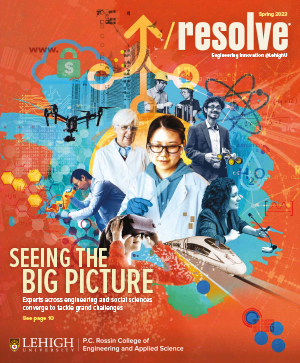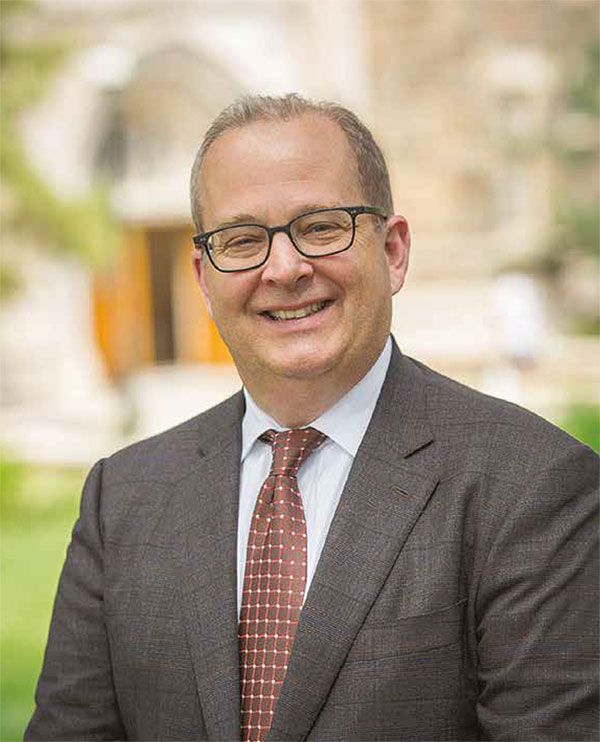 This issue of Resolve is dedicated to efforts that connect disciplines, and entire communities, in pursuit of common goals that are grounded in equity and sustainability. In particular, several emerging research initiatives on our campus underline Lehigh’s ability to contribute to scientific and technological discovery by bridging disciplines in novel ways to bring about real, lasting, consequential change.
This issue of Resolve is dedicated to efforts that connect disciplines, and entire communities, in pursuit of common goals that are grounded in equity and sustainability. In particular, several emerging research initiatives on our campus underline Lehigh’s ability to contribute to scientific and technological discovery by bridging disciplines in novel ways to bring about real, lasting, consequential change.
This concept of convergence research animates the broader scientific community these days, as well. Convergence research is use-inspired scientific exploration driven by a specific problem or societal need that gathers an intellectually diverse set of experts to address a pivotal issue from all angles.
Global challenges that require this approach dominate news headlines: Think population health, sustainable energy, climate change, and the impact of online misinformation, for example. Sponsor agencies such as the National Science Foundation (NSF) increasingly prioritize convergence-driven projects in their solicitation efforts.
Convergence calls for interdisciplinary team science, and Lehigh is hardwired for endeavors of this nature. After all, applied, boundary-dissolving research and education is the very foundation of our institution. Examples abound across our educational programs, the achievements of our alumni, and the research agendas of our faculty.
Since their inception, Lehigh’s Interdisciplinary Research Institutes (IRIs) have been a clear manifestation of our community’s convergence research mindset in action. They have nurtured discovery in areas such as infrastructure design and socioeconomics, materials science and health, and human-centered computing, to name a few. The IRIs encourage partnership that exposes us to new ways of thinking about our work as engineers, thereby throwing into sharp relief the human impact of that work.
Read on to learn about a new partnership arising from the IRIs that brings together researchers from the Rossin College, the College of Arts and Sciences, and the Institute for Indigenous Studies within Lehigh’s College of Health. The collaboration cuts across engineering, biology, data science, cognitive psychology, and population health in a groundbreaking effort to prevent the next pandemic among some of society’s most vulnerable groups.
Another emerging research partnership, this one among experts in computer science and journalism, seeks to better understand the power of social media in framing individuals’ beliefs and influencing their actions. It’s a fascinating exploration of how technology shapes cognition, emotion, and behavior.
This issue also highlights a string of winning bids to land Major Research Instrumentation support from the NSF. The secret to our considerable success rate in these proposals is, in fact, not so secret: Scores of faculty, hailing from a range of disciplines across Lehigh’s IRIs, joined forces to prove how broadly these grants could be leveraged across our research community and beyond.
We also introduce three new faculty in the Department of Civil and Environmental Engineering whose arrival on campus is another clear indication of Lehigh’s convergence mindset. Professors Farrah Moazeni, Gabrielle String (who holds a dual appointment in the College of Health), and Maryam Rahnemoonfar (who holds a dual appointment in computer science and engineering) bring with them innovative, outward-looking data-driven research. They draw upon expertise in artificial intelligence, smart devices and systems, and humanitarian engineering to address sustainability challenges involving water, energy, and infrastructure, and the associated social impact. Importantly, they also help to bring the department faculty’s gender balance into alignment with that of its students—an achievement in equity and inclusion that strengthens our research portfolio and our mentorship of the next generation of Lehigh engineers.
We also check in with Svetlana Tatic-Lucic, a Rossin College faculty member currently serving a stint as a program director with the NSF. In this capacity, she oversees efforts to support interdisciplinary science and engineering research sponsorship in the area of sensing and biomedical applications. Svetlana describes how her experience at Lehigh prepared her to tackle this important role.
Thank you as always for your interest in Lehigh Engineering and the Rossin College. Please drop me a note with your comments.

Stephen P. DeWeerth, Professor and Dean
P.C. Rossin College of Engineering and Applied Science
steve.deweerth@lehigh.edu

